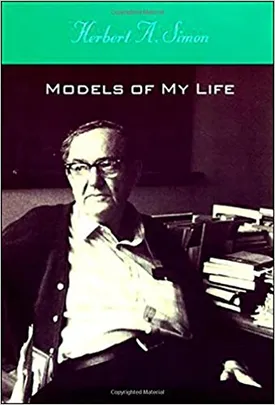Herbert A. Simon
Herbert A. Simon (1916–2001) was one of the most influential and celebrated thinkers, researchers, authors, and educators of the 20th century. His work spanned many disciplines including psychology, economics, computer science, philosophy, and artificial intelligence. As an author, he wrote over 20 books and hundreds of papers. He was an early leader in the development and application of artificial intelligence and cognitive science to problems of decision making and problem solving at the individual, organizational, and societal levels.
Herbert Alexander Simon was born on June 15, 1916, in Milwaukee, Wisconsin. He attended the University of Chicago, where he earned both a bachelor's in political science and a master's in the same field. After earning his bachelor's degree from Chicago in 1936, Simon went to Harvard and received a Ph.D. in political science in 1943.
Simon entered the University of Chicago's business school after graduating and started his career in operations research. His research at the university focused on how administrators and decision-makers weigh available evidence before committing to an action. He coined the term “bounded rationality” to capture the notion that decision-makers do not always have access to all the relevant information but instead make decisions based on what is within their reach. He went on to apply his ideas to economics and other fields, developing theories rooted in his study of cognitive psychology and decision making.
In addition to having significant influence in economics and artificial intelligence, Simon was also a pioneer in the fields of organizational behavior and information systems. He explored how organizations and institutions shape, and are shaped by, the decisions of their members. He theorized that much of the decision-making process can be reduced to a problem-solving process. He proposed that by simulating decision-making with computers and computer models, organizational performance could be improved. This research, which was published in books like The Sciences of the Artificial (1969), was revolutionary in the field of artificial intelligence.
In his later work, Simon applied his theories to the field of computational linguistics, exploring how computers could communicate with people and pass judgement just like humans do. He was awarded the Nobel Prize in Economics in 1978 for his entry into the field of artificial intelligence and theories of the firm.
In the final years of his life, Simon stayed actively involved in many research projects, though he was mostly semi-retired from his teaching duties. He was awarded the National Medal of Science from the United States in 1991 and the Kyoto Prize from Japan in Science and Technology in 1997. He died of complications from a stroke in 2001.
Herbert Simon's legacy lives on in the many books and papers he wrote, and in the research projects and theories he created. He was a brilliant thinker whose work had a lasting impact on areas such as cognition, decision making, and artificial intelligence. His research played a significant role in laying the foundation for later development in the field of artificial intelligence, a field of research that continues to expand and influence the world today. His influence on the world of business, economics, and problem solving remains invaluable. His work teaches us how to think rationally and logically, how to make decisions with incomplete information, and how to optimize our resources and problem-solving capabilities.

